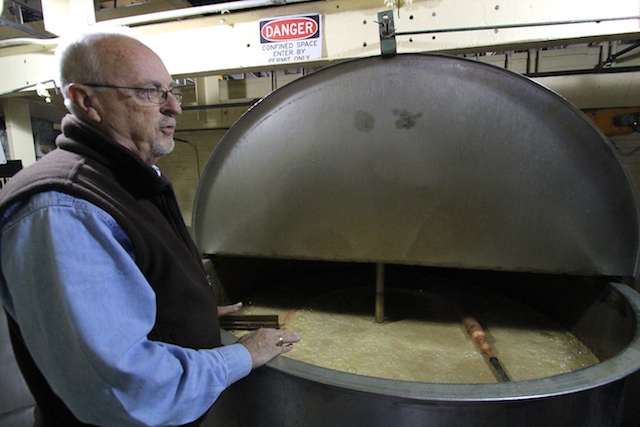Kentucky: Day 4 – A Few Notes

There's a lot information I've written down over the last few days that I haven't been able to fit into the general posts, for which I have about 45 minutes each to write. It's not easy to edit both photos and pump out a stream-of-consciousness article when you're in a hurry, so not everything makes the cut.
One story I thought was very interesting from yesterday's visit was Jim Rutledge's account of an evening in back in 1996 when they forgot to add barley to the mashbill. We always talk about corn and rye, or corn and wheat, when we talk about the contents of Bourbon, but the barley plays a very important role. Corn is a starch that can be converted to sugar, and eventually to alcohol, but the proper enzymes need to be introduced. When we chew on starch our saliva helps us with that process. When you're cooking a mash for fermentation, barley helps to provide those enzymes (so can commercial enzyme powder if you're lazy), so it's absolutely vital to the process. For some reason that night, either by absent-mindedness or a mechanical failure, the barley wasn't dropped into the mash and the cook took place with just the corn and rye.
By the time Jim's assistant notified him of the problem, the corn and rye mash had been cooking for long enough to turn into a sticky goo – about the consistency of peanut butter, according to Jim. It was a mess. They had to start pumping cold water into the tank as fast as possible so that the goop wouldn't make its way into the pipes and clog up the entire operation. As enzymes break down the sugar they help to maintain the viscosity of the mash. Without that process the whole batch can turn to sludge. The fermentation time at Four Roses is about 80 hours per tank, which seems crazy to me because most distilleries in Scotland are doing it much faster. Oban's ferment time is also 80 hours and they're notorious because of that. It's one of the reasons they claim their whisky is so light and fruity. Jim feels the same way about Four Roses. "If you're looking for just the straight alcohol there are faster ways of doing it," he said. Obviously he's looking for more than that.
-David Driscoll
